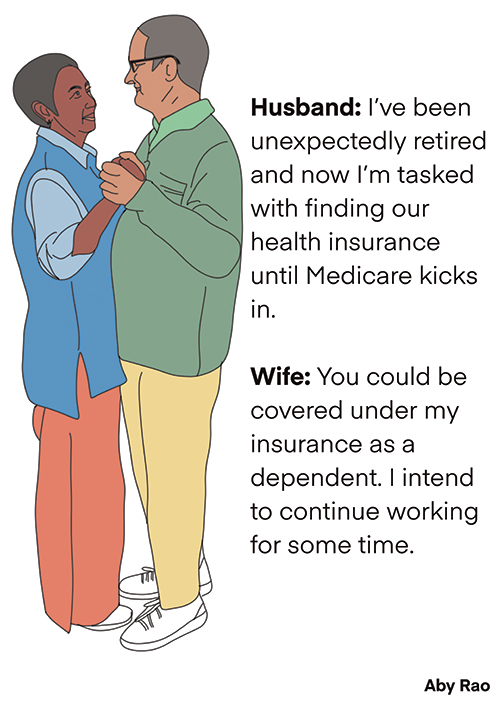
Whether it is voluntary retirement or involuntary retirement, sometimes not by choice but it happens, it does not really matter because we should prepare and plan. This is one of the aspects of financial planning that does not get full and deserving attention, especially from the younger population. There is certainly a segment of the population that is thinking of doing just that, retiring early, that is, feeling confident that they will be able to manage well with the new reduced income stream and for a longer period of time span. I have talked about FIRE philosophy here before and these folks most certainly have to do much more long-term planning, including health insurance.
FIRE (Financially Independent, Retire Early) is a philosophy some young folks follow where they work very hard and long hours during the first 15/20 years of their careers and accumulate enough wealth to retire at an early age, say around 40 or 45. There are some risks involved in this thinking, but they can be mitigated.
 Generally, the retirement age is considered to be 65 in the United States. Most of the time this does not happen. It is usually sooner, say 62; even 55 for the employees of some of the big corporations when they get under pressure to reduce the fixed cost of the business. They may offer early retirement when the revenue starts drooping in as often happens during a recession. Granted most of such folks get some sort of parting package which includes some salary compensation and health insurance at least for a while but may not take them all the way to 65 when the Medicare coverage would kick in. By the way, according to a Gallop survey the average age of retirement is 61.
Generally, the retirement age is considered to be 65 in the United States. Most of the time this does not happen. It is usually sooner, say 62; even 55 for the employees of some of the big corporations when they get under pressure to reduce the fixed cost of the business. They may offer early retirement when the revenue starts drooping in as often happens during a recession. Granted most of such folks get some sort of parting package which includes some salary compensation and health insurance at least for a while but may not take them all the way to 65 when the Medicare coverage would kick in. By the way, according to a Gallop survey the average age of retirement is 61.
The question really is how one should handle such scenarios when reality hits and we actually face it. The most difficult part generally is the health insurance for oneself and perhaps for the family too, if not for children, then at least for the spouse. As mentioned above, if the average age is 61, then we face the task of finding health insurance for those four years.
If your ex-employer offers a health insurance plan for retirees, then count yourself lucky. These plans were fairly common decades ago, but in a recent survey by Mercer only 36 percent of companies offer that now. Since most retirees are closer to 65, these plans are in-line with Medicare plans to ease the transition. You have to pay premiums, of course, but sometimes they are subsidized.
So, first, let us look at other health insurance options. This is where we begin to appreciate the benefits of the ACA (Affordable Care Act) law passed in 2010, what is more popularly known as Obamacare. This benefit is available to all, but it is mainly designed to support low-income families who cannot afford health insurance otherwise. ACA does that by subsidizing, by giving credits in annual tax-returns, the premiums that one would pay for such insurance, and as you can guess the subsidizing part is available only up to a certain income level depending on the family size. But the insurance is available to anyone who wants it; you only have to pay higher premiums if you don’t qualify for a subsidy.
There are many other options available. If you need time to review, evaluate and compare different options then the immediate thing to do is to go on COBRA plan which your company, with whom you are parting ways, is required to offer you. This plan is the same as what you had when you were working with them, but the premiums are different. When you were working you were paying 10 percent of the cost, and the company was paying 90 percent of the total cost. After you leave you are paying 100 percent, and they are paying nothing for the same plan and there is a 2 percent charge for administrative fees. COBRA should be looked at as a stop-gap solution to buy some time to shop the market and not as a permanent answer. It is also only good for 18 months.
If your spouse is still working and wants to continue working, then getting on his or her employee-sponsored group coverage plan as a dependent is a desirable thing to consider.
Such employer plans typically come with a broader physician network and lower deductibles. There is, however, a time limit, say 30 days after you leave your job, within which you have to apply for a spousal plan.
If ACA or spousal plan is not an option for you then shopping for your health insurance in the general market is always an option, especially when you are in good health. Before the age of 65, it is really not that hard to manage your health and keep the doldrums away. You also have the time now to do all the things you wanted to do but could not do previously. Keeping good health has to become your priority. It will also help you find the right insurance at the right price. There are plenty of health insurance companies that will be more than happy to offer you a price that will give you what you are looking for. It is only for a short term (generally between 4 to 8 years) deal until you hit 65 when Medicare takes over. As you compare the plan choices, check the premium, annual deductible, co-payment amounts, out of pocket maximum and level of prescription coverage. It is also a good idea to consider the provider network. If you wish to use certain physicians or facilities, then try to get on a plan that covers your preferred providers.
Retiring early could be a great dream to live for but I also suggest that the more research you are able to do, like behind the scenes homework before the time comes, the more prepared you would be. Health is certainly a critical factor for insurance premiums, and it really does not disappear no matter what age you are. Don’t let that be the determining factor in your golden years.
Mo Vidwans is an independent, board certified financial planner. For details visit, vidwansfinancial.com, call 734-476-0579 or write to: [email protected]



